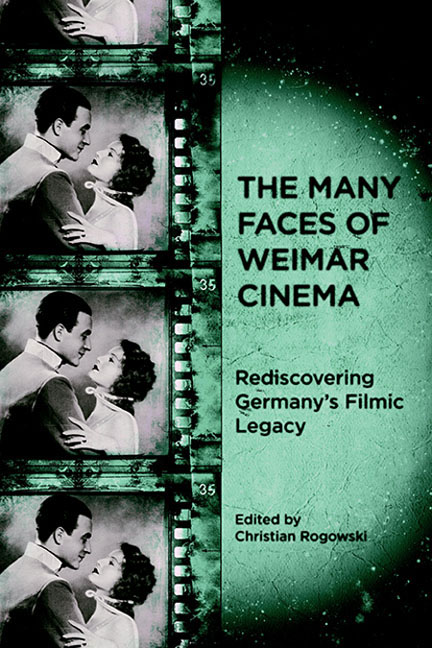Book contents
- Frontmatter
- Contents
- List of Illustrations
- Preface
- Introduction: Images and Imaginaries
- 1 Richard Oswald and the Social Hygiene Film: Promoting Public Health or Promiscuity?
- 2 Unsettling Nerves: Investigating War Trauma in Robert Reinert's Nerven (1919)
- 3 Humanity Unleashed: Anti-Bolshevism as Popular Culture in Early Weimar Cinema
- 4 Desire versus Despotism: The Politics of Sumurun (1920), Ernst Lubitsch's “Oriental” Fantasy
- 5 Romeo with Sidelocks: Jewish-Gentile Romance in E. A. Dupont's Das alte Gesetz (1923) and Other Early Weimar Assimilation Films
- 6 “These Hands Are Not My Hands”: War Trauma and Masculinity in Crisis in Robert Wiene's Orlacs Hände (1924)
- 7 The Star System in Weimar Cinema
- 8 Schaulust: Sexuality and Trauma in Conrad Veidt's Masculine Masquerades
- 9 The Musical Promise of Abstract Film
- 10 The International Project of National(ist) Film: Franz Osten in India
- 11 The Body in Time: Wilhelm Prager's Wege zu Kraft und Schönheit (1925)
- 12 Henrik Galeen's Alraune (1927): The Vamp and The Root of Horror
- 13 The Dialectic of (Sexual) Enlightenment: Wilhelm Dieterle's Geschlecht in Fesseln (1928)
- 14 Babel's Business — On Ufa's Multiple Language Film Versions, 1929–1933
- 15 “A New Era of Peace and Understanding”: The Integration of Sound Film into German Popular Cinema, 1929–1932
- 16 Landscapes of Death: Space and the Mobilization Genre in G. W. Pabst's Westfront 1918 (1930)
- 17 Undermining Babel: Victor Trivas's Niemandsland (1931)
- 18 Unmasking Brigitte Helm and Marlene Dietrich: The Vamp in German Romantic Comedies (1930–33)
- Filmography
- Notes on the Contributors
- Index
Preface
Published online by Cambridge University Press: 29 April 2017
- Frontmatter
- Contents
- List of Illustrations
- Preface
- Introduction: Images and Imaginaries
- 1 Richard Oswald and the Social Hygiene Film: Promoting Public Health or Promiscuity?
- 2 Unsettling Nerves: Investigating War Trauma in Robert Reinert's Nerven (1919)
- 3 Humanity Unleashed: Anti-Bolshevism as Popular Culture in Early Weimar Cinema
- 4 Desire versus Despotism: The Politics of Sumurun (1920), Ernst Lubitsch's “Oriental” Fantasy
- 5 Romeo with Sidelocks: Jewish-Gentile Romance in E. A. Dupont's Das alte Gesetz (1923) and Other Early Weimar Assimilation Films
- 6 “These Hands Are Not My Hands”: War Trauma and Masculinity in Crisis in Robert Wiene's Orlacs Hände (1924)
- 7 The Star System in Weimar Cinema
- 8 Schaulust: Sexuality and Trauma in Conrad Veidt's Masculine Masquerades
- 9 The Musical Promise of Abstract Film
- 10 The International Project of National(ist) Film: Franz Osten in India
- 11 The Body in Time: Wilhelm Prager's Wege zu Kraft und Schönheit (1925)
- 12 Henrik Galeen's Alraune (1927): The Vamp and The Root of Horror
- 13 The Dialectic of (Sexual) Enlightenment: Wilhelm Dieterle's Geschlecht in Fesseln (1928)
- 14 Babel's Business — On Ufa's Multiple Language Film Versions, 1929–1933
- 15 “A New Era of Peace and Understanding”: The Integration of Sound Film into German Popular Cinema, 1929–1932
- 16 Landscapes of Death: Space and the Mobilization Genre in G. W. Pabst's Westfront 1918 (1930)
- 17 Undermining Babel: Victor Trivas's Niemandsland (1931)
- 18 Unmasking Brigitte Helm and Marlene Dietrich: The Vamp in German Romantic Comedies (1930–33)
- Filmography
- Notes on the Contributors
- Index
Summary
These are exciting times for the study of Weimar Cinema: in the summer of 2008, the international press was abuzz with news that a nearly complete print of the original version of Fritz Lang's Metropolis (1927) had been found in Argentina, one that includes footage long thought to have been irretrievably lost. Now we can look forward to the opportunity of experiencing Lang's legendary science-fiction epic as he originally imagined it both visually and aurally. In February 2010, a reconstructed version was unveiled at a lavish gala presentation at Berlin's Friedrichstadtpalast, complete with a live symphony orchestra performing the original score, and beamed to crowds at the Brandenburg Gate. This reconstruction, with some thirty minutes of recovered footage, may resolve many of the questions raised by the inconsistencies and omissions in the truncated version created in the 1920s for circulation in the United States, upon which much of the film's fame rests. While this may indeed be the most spectacular and the most significant rediscovery of Weimar film footage, it is only one instance in many. Over the past two decades, prints of many films from the period have resurfaced, primarily in European archives, sometimes in surprisingly good quality. Archives and research institutions in Europe and the United States have begun to collaborate on restoring rare films from the Weimar period, making them available to researchers and, increasingly, to interested audiences at large.
Today we can enjoy meticulous and intriguingly beautiful reconstructions not only of canonical masterpieces but also of many lesser-known, but no less important, Weimar German films. In the United States, Kino International has teamed up with the German Murnau-Foundation to release significant films on DVD, including some discussed in this volume, such as Ernst Lubitsch's early silent Sumurun, Robert Wiene's Orlacs Hände (The Hands of Orlac), and German “experimental” films. In Germany, Filmmuseum Munich has started an equally excellent series of DVD releases, among them Robert Reinert's Nerven (Nerves) highlighted in this volume. The Austrian Filmarchive in Vienna has made available other films, accompanied by extensive volumes of essays. It is to be hoped that such official releases of Weimar-era films will soon replace the numerous DVDs and videotapes of questionable quality (and often dubious origins) circulating in this country.
- Type
- Chapter
- Information
- The Many Faces of Weimar CinemaRediscovering Germany's Filmic Legacy, pp. xi - xivPublisher: Boydell & BrewerPrint publication year: 2010



